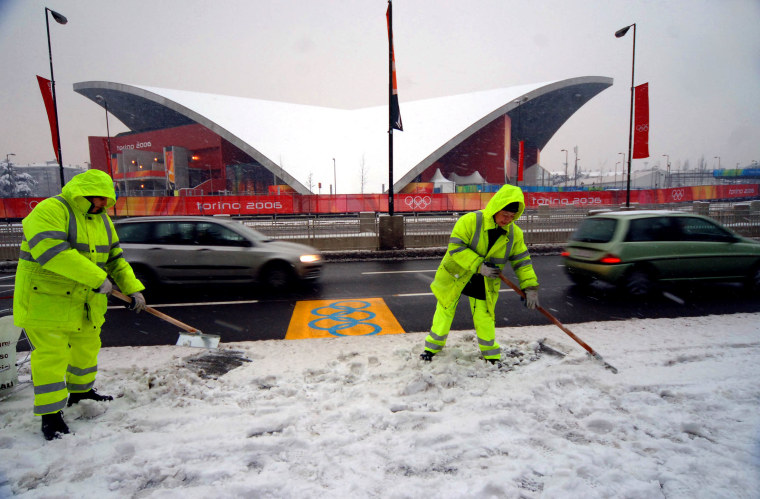The thrill of victory, the agony of defeat ... and the catastrophe of empty stands? When organizers of the 2006 Winter Olympics disclosed in December that only 60 percent of available tickets had been sold less than two months before the Feb. 10 opening ceremonies, some wondered if the games in Turin, Italy, were headed for a financial meltdown.
Not to worry. Sales have picked up since then, particularly among Italian sports fans, who tend to wait until the last minute before buying. The local organizing committee says about 80 percent of tickets now have been sold. But in truth, the financial success of these games was never riding on the spectators. The Turin Olympics, far more than any past Winter Games, is being financed by TV broadcasters and big corporate sponsors.
Expanded coverage
Of the $1.5 billion operating budget for these games, some $600 million, or 40 percent, will come from payments by NBC and others for broadcasting rights. That's up from 33 percent of the budget at the 2002 Winter Games in Salt Lake City. Another 39 percent of revenue for the Turin games is coming from corporate sponsorships. As for ticket sales? They're expected to contribute a paltry 6 percent, down from 13 percent in Salt Lake City.
Increasingly, Olympic games are underwritten by huge multiyear agreements inked years before the games take place. NBC, in fact, agreed to pay $3.5 billion for broadcast rights to five Olympic Games, from 2000 through 2008, says Stephen Wenn, a professor at Wilfrid Laurier University in Canada and an expert on Olympic financing. The money goes to the International Olympic Committee, which keeps 51 percent and hands out the rest to local organizing committees. NBC is by far the biggest TV spender, but European and Japanese broadcasters also pay handsomely.
Why are the broadcasters spending so much at Turin? A key reason is the proliferation of satellite, cable television, and Internet programming, which give broadcasters more platforms for targeting specialized audiences, Wenn says. For example, during the Turin games, hockey fanatics will be able to catch live coverage of all 54 games in both the men's and women's hockey tournaments either on NBC or on one of its three cable networks: USA, MSNBC, and CNBC. And, for the first time, NBC will offer high-definition simulcasts, available on television or the Internet. "Having these multiple platforms opens new revenue streams for them," Wenn says.
Brought to you by ...
All told, NBC outlets will provide 418 hours of coverage from Turin, including 200 hours of live coverage, up from 140 from the Salt Lake City games. "We learned a lot from our Salt Lake experience," Molly Solomon, NBC's coordinating Olympics producer, told reporters at a Jan. 22 briefing. "In Turin, we've really increased our cable volume."
Corporate sponsors are also signing up for big multiyear deals. Some $173 million of the Turin Games revenues will come from 11 multinationals that signed package deals to sponsor the 2006 Winter Games as well as the 2008 Summer Games in Beijing — including McDonald's and General Electric
Separately, four leading Italian companies — Fiat Group, the Sanpaolo IMI banking group, and Telecom Italia and its TIM mobile phone subsidiary — have signed up as major corporate sponsors. The Turin organizers haven't disclosed the amount of those pledges, but it's probably close to $50 million per company, says Mike Laflin, who heads Sportcal.com, a London-based consulting group that tracks corporate sponsorship of sports events. Rounding out the corporate sponsorships are nearly 50 other companies that are providing in-kind services and supplies to the games.
Snow problem
Despite the corporate largesse, there were some anxious moments late last year when organizers disclosed a $76 million shortfall in the Turin Games's budget, caused by cost overruns and lower-than-expected aid from the Italian government. To plug the gap, the government agreed in December to sponsor a scratch-card lottery that is expected to produce about $24 million in revenue. Local and regional governments have agreed to make up the rest.
At least, it appears the Turin organizers won't have to worry about one thing: snow. As recently as mid-January, there had been scant snowfall in the alpine villages where most of the outdoor events will be held. But heavy snow blanketed the area on Jan. 27, and with most of the skiing venues at high altitudes, it's unlikely that much will melt. With snow on the ground and the budget in balance, Olympics-watchers can turn their attention to other issues — like what on earth Bode Miller is going to say next.
